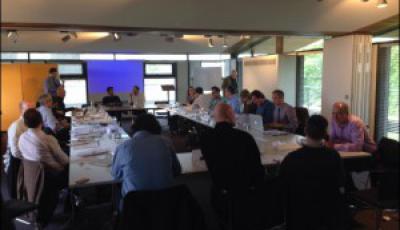Criminology doesn’t have a monopoly over studies of policing. On 23 and 24 April 2015, a workshop for the forthcoming SAGE Handbook of Global Policing, convened by three of the co-editors, the Centre for Criminology’s Ian Loader, Ben Bradford, and Jonny Steinberg, demonstrated that fact by bringing together authors almost exclusively from outside the discipline. From anthropology, philosophy, history, English literature to (post)colonial studies, the editors’ efforts to produce an interdisciplinary edited collection urges criminologists to foster new and productive intellectual relations outside the discipline. The ‘global’ concept of the Handbook’s title doesn’t straightforwardly reflect geographical or spatial concerns. Rather, the concepts of geography and space are becoming increasingly complex as the global aspect of policing—once easily associated with the long arm of colonial and imperial rule—is transferred to the local or micro-level context as we see different manifestations of policing rolled out to different sectors of a population. The global, then, is inextricably linked to identity and its construction, which is in turn related to substantive themes discussed in the workshop. These included military policing, the (justifiable) use of lethal force, and mobility and their sedimentation in historical regimes of policing.

In what follows, I discuss three draft papers for the Handbook; those by Kevin Karpiak, James Purdon, and Ben Bradford and Ian Loader. My aim, in respect of bringing together scholars from such varied disciplines to construct this new field of global policing, is to offer some reflections on canonicity to acknowledge the privileged position the authors occupy in shaping the field.
The discussion that arose from Kevin’s paper, ‘The anthropology of the police,’ highlighted what policing studies might mean for different disciplinary methodologies. Kevin spoke of anthropological method as representation, a conception of method that criminology has historically struggled to accept. In short, positionality, or subject-position, shapes epistemology, method and therefore academic labour as representation and perhaps discussions of this kind might foster scholars to consider the position from which they write—for example, one author highlighted a very real concern he and his co-author shared because of their respective nationalities and how their identities intersect with the political context of their research to shape both what and how they research. I don’t cite their names or discuss their research here in order to honour that concern.
In his paper, ‘Literature and policing,’ James’s argument that literary fiction holds a transformative or affective potential to shape and constitute policing and its relation to the global resonates with the earlier discussion of Kevin’s paper. Yet, I wondered whether James might identify what about the authors’ identity that, in part, constitutes the transformative potential of their fiction? For example, is the narrative of Rudyard Kipling’s experiential disjuncture between his imagined expectation of policing and its empirical reality in colonial Calcutta a result of existential anxiety about ‘race’ and space in relation to his subject position as a white man? And is the notable absence of ‘race’ in Graham Greene’s The Confidential Agent, a narrative which sees the identity of Greene’s protagonist, ‘D,’ constructed through a historically racist identification practice, an omission because of Greene’s subject-position as a white man; or might we interpret the omission as literary method that serves to highlight the artificiality of policing ‘race’? And what about the absence of gender, both in literature’s authorship and narrative?
Ben and Ian’s paper, ‘Police, crime and order: the case of stop and search,’ saw the Centre for Criminology’s Alpa Parmar encourage the audience to reflect on just how important it is to continue to have minority-group perspectives represented in a workshop of this kind. For Ben and Ian, although race matters, it ought not divert our attention from the more general importance of marginality, however this is constructed, in our understanding of why and how police use the power to stop and search―an argument they developed in light of Katherine Murray’s doctoral research undertaken at the University of Edinburgh on the Scottish case of police stop and search and the exceptional absence of ‘race’ in this context. This isn’t to say, of course, that if Scotland had a large ‘visible’ minority population then it wouldn’t be the special object of police attention, as is the case south of the border. In any case, the global has a profound meaning in predominantly white Scotland and not least in Glasgow with its continuing sectarian divide between Catholic and Protestant, one which is bound up with the respective nationalist causes of the Ulster conflict. A more nuanced interpretation of the identities of those stopped and searched in Glasgow might pay attention to ethnicity in a locale where Catholic and Protestant ‘Ned’ identities are self-selectively performed through dress and language and where the policing of young white men from those communities provides an example of how police practice is implicated in the formation of racial identities.
Today, the meaning of the global transcends space as its politics manifest at the local level and the identification of its contours become less obvious and more ideologically embedded. The study of policing demands the attention and collaboration of scholars from across the academy who are willing to render visible an otherwise invisible politics that serve to justify, to take just one example, the use of lethal force (a substantive theme of the workshop) by white police officers against young, black men in the United States. The contributors to the SAGE Handbook of Global Policing are well-positioned to undertake this task.
The SAGE Handbook of Global Policing is edited by Beatrice Jauregui, Ben Bradford, Ian Loader and Jonny Steinberg and will be published in Spring 2016. Kate would like to thank Alpa Parmar, Mary Bosworth, and Ben Bradford for their comments on earlier drafts of this post.
Keywords:
Share:
